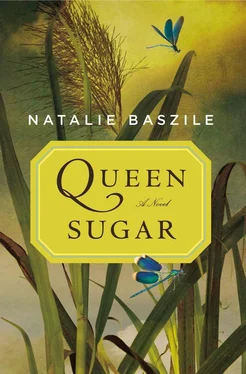Ralph Angel reached into the well and lifted a book to the window. “ The Southern Gardener .” He flipped the pages, bending them slightly at the corners.
Charley cringed. He may as well have been rifling her underwear drawer. “Careful with that,” she said, “it’s not mine,” and practically snatched the book from him.
• • •
Even in the near-darkness Charley could tell, by the height of the headlights and the rhythm of their bounce, that the approaching vehicle was a tractor. As they got closer, she saw that it pulled an enormous V-shaped trailer loaded to the top with cane. Stalks jutted through the metal rails and spilled over the sides. Charley slowed. “Will you look at that?” Gazing up at the creaking wagon, Charley couldn’t help but smile. It was the second sign, after the burnt-sugar smell, that grinding season had officially begun.
When the tractor passed, Charley touched the necklace Mr. Guidry gave her, fingering each of the nine tiny knots.
“Where’d you get that?” Ralph Angel asked.
“It’s nothing.”
“Please tell me you don’t believe in all that hoodoo shit.”
Charley pressed the necklace to her throat. “It can’t hurt,” she said, her mind drifting back to the dark woods. Maybe she was imagining things, but she felt different — still anxious about their chances, still nervous about how much The Cane Cutter would sell for, knowing that it was her last hope, still furious with Miss Honey — but there was a quiet calmness too, one that had not been there before, as though a cocoon, loose and silky, had been spun around her.
Ralph Angel rolled his eyes.
“You only break when the cane wagon is empty and goes to reload,” Charley said. And since she was at it, added, “You have an hour for lunch,” and thought of the plate covered in tinfoil — last night’s pork chops — still on the stove where Miss Honey left it for her. She would ask Denton to pick up an extra sandwich if he went into town.
“Aye, aye,” Ralph Angel said and saluted. “No breaks unless the wagon is empty; an hour for lunch; clock out at seven.”
If she weren’t so angry with Ralph Angel, Charley thought, his response just now would be funny. Which is what Ralph Angel must have thought too, because he smiled to himself, and Charley felt a quick softening around the edges of her disgust. From the corner of her eye she watched Ralph Angel slip his hands into his gloves. They were extra large and looked cartoonish on his hands.
“It was the only size left,” Charley said. “One of the guys might trade with you.”
Ralph Angel shook the gloves into his lap, and for the next mile, they rode with just the radio playing, until Charley glanced over and said, “When I told Miss Honey I didn’t want to hire you, you know it wasn’t personal, right?”
Ralph Angel looked at Charley. His expression was cold. “Everything’s personal,” he said, then turned to the window.
• • •
At the shop, Denton and Alison had built fires in two empty oil drums and the crews huddled around them, warming their hands as the flames licked their fingers. Charley saw half a dozen new faces, men Denton recruited back in July, in addition to Romero and his crew. She introduced herself, asked the new men’s names, what towns they were from, and welcomed them to her farm.
“You ready?” Denton zipped his jacket. He stopped, puzzled, when he saw Ralph Angel.
“I’ll explain later,” Charley said, though she still hadn’t decided what she’d say.
“Hey, Denton,” Alison called, the first cigarette of the day bobbing from his lips. “Why’re we standing around?”
“Take it easy.”
“I can’t help it. First day of grinding always gets me fired up. Feel like a damned jitterbug.”
Denton called for everyone to gather ’round and mapped out the day. Romero’s men would keep planting while he, Alison, and Charley drove the tractors and the combines through the fields that were ready for harvesting. The new guys would replenish the planting wagons and haul the cut cane to the mill.
“Bayonne is taking four hundred tons a day,” Denton announced. “We got eight cane wagons, but we really need ten. That means we got no time to waste. Longer that cane sits once it’s cut, more likely it goes sour. Got to keep things moving. It’s all got to flow.” He reached into an old duffel bag, doled out walkie-talkies, and told the men to check in on the hour. “Questions? Anyone got anything they want to say?”
“Yeah.” Alison raised his hand and stepped forward. “As some of you know, I ain’t too high on organized religion.” He glanced at Charley and Denton. “The Lord hasn’t exactly been good to me these last few years, but that’s beside the point. I think we should say a prayer, just to be safe. I’ll lead it if you want.”
All heads bowed.
“Gracious Lord,” Alison began. “You know if there’s ever been a sadder group of folks just trying to do what’s right, it’s this group of misfits right here. Why Miss Bordelon came down here and teamed up with us two old goats continues to be a mystery. But if you want my opinion, I think we done a pretty freaking good job pulling her farm together. The way I see it, we got a chance of bringing in a decent crop. So Lord, I’m asking you to cut us a break. You don’t have to perform any miracles or nothing, though that’d be nice. All I’m asking is that you let us do what we do best, what each of us was born to do. Let us be the best damn cane farmers we can be. Help us get to the end of this grinding season, and maybe even live to do it all again this time next year. Oh, and stick close to Miss Bordelon when she goes to New Orleans tomorrow. Amen.”
Amen.
• • •
The sun had risen in earnest, the fog lifting off the fields to reveal a carpet of solid green so thick Charley couldn’t see between the rows. In the combine, she fingered the knots on her necklace and waited for the signal. Another minute, and the walkie-talkie on the dashboard crackled— Jose to Missus. One-two-three. Through the window, she gave Jose the thumbs-up, turned the ignition, and the combine lurched forward, the massive scrolls on its front end slowly turning. Down on the ground, cane stalks trembled. The machine moved forward, chewing through the rows. She made sure to stay a few feet ahead of Jose’s tractor so that the combine was in line with the cane wagon he pulled as they moved along the row. Choppers inside the combine stripped leaves from stalks and cut the cane into billets, carrot-size pieces that traveled up the conveyor belt into a chute that spat them into the cane wagon. As Charley drove, shredded leaves and dirt fell around her like rain.
In an hour, the first two cane wagons were full. Jose pulled the tractor onto the headlands and waited for a driver to unhitch him. In the combine, Charley’s walkie-talkie sputtered, then Denton’s voice came in clear. He was sending Huey Boy out to relieve her.
“But I’m fine. I’ve got a rhythm going out here.”
“Okay, but I thought you’d want to be the one to haul the first load to the mill.”
• • •
Set back from the road, the Bayonne Sugar Mill was a jumble of geometric shapes — triangular warehouse roofs, cylindrical smokestacks, boxy square buildings housing the boilers and evaporation tanks, parallel rows of bulging cane wagons waiting in the yard to be unloaded. In Pittsburgh or Milwaukee, a mill like Bayonne Sugar would have closed years ago, dismantled and shipped piece by piece to Cuba or Santo Domingo, or converted into a sprawling indoor shopping mall with a food court and a metroplex. But this was Louisiana, and Bayonne Sugar was the largest, most powerful sugar mill of them all. Take that, Landry and Baron! Smoke and steam billowed from the stacks while the windows in the main building glowed orange as bagasse , the shredded cane pulp, burned. The air vibrated with the muffled roar of furnaces and the drone of gears turning. Twenty-four hours a day, from now through the end of the year, Bayonne Sugar would roar and growl and hiss until it pulverized, ground, and boiled every stalk of cane to crystal.
Читать дальше












